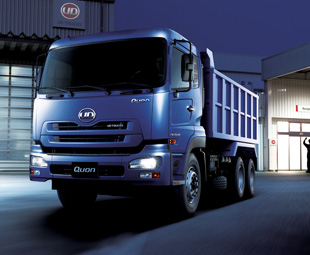UD Trucks tackles fuel consumption

With fossil fuels likely to be around for the foreseeable future, and the quality of fuels not as good as it should be, UD Trucks is committed to providing the appropriate technology for operators in Africa.
Fuel is playing an increasingly vital role in the transport industry, as it forms a major part of the costs involved in operating a truck. “It is becoming all the more important for customers to carefully consider the fuel consumption statistics of a vehicle before purchasing a truck,” says Rory Schulz, general manager of corporate planning and marketing at UD Trucks Southern Africa. “In addition, one needs to look at aspects like driver training, careful route planning and optimal load maximisation to ensure the most efficient operation of a vehicle.”
If one makes a case study of some typical rigid-vehicle applications with typical annual mileage, operating at an all-up mass of seven, 15 and 26 tonnes respectively, the fuel cost will constitute between 25 and 27 percent of a fleet owner’s annual operating costs. In a typical truck-tractor and interlink application the fuel constitutes around 50 to 56 percent of the operating cost.
“Environmental factors such as temperature and wind, as well as road surface type and operating conditions, always warrant strong consideration when factoring fuel consumption figures,” says Schulz.
The truck’s body type and overall frontal area, the specific tuning of the engine and driveline components, tyre choice, tyre pressure and wheel alignment, as well as the load or all-up operating mass of the vehicle – are all on his list of aspects that need constant monitoring and attention.
Over the years, UD Trucks has continually invested in researching the best fuel consumption practices and applications for its local product range. The company therefore believes in introducing only those trucks that employ appropriate technology for the demanding road and operating conditions of the African continent.
“The quality and hygiene of fuel, that is available in many places in the southern African region, often leaves a lot to be desired,” notes Schulz. “Furthermore, it is imperative that one uses the appropriate fuel for the specific design of the fuel system of any particular vehicle, in other words, ultra-low sulphur diesel or 10ppm for Euro-4 and upwards. Driver training is also playing an increasingly important role, as the correct driving techniques can save operators a lot of money in the long run.”
Over the years, many technological advances have been made to increase fuel efficiency. Initially mechanical advances improved volumetric efficiency and combustion chamber design and shapes. Fuel measurement and metering as well as tuning, have also contributed to the efficiency of trucks through the years. These also included advancements in fuel technology.
However, the most significant improvement came in the form of electronic control units, which have allowed manufacturers to control the exact amount of fuel that is injected at a specific pressure with precision timing. This vital development resulted in overall combustion efficiency. It also helps operators achieve lower emissions, which ultimately leads to improved fuel economy.
To enable operators to keep vehicles operating in this ideal range, multi-speed transmissions were introduced and further developments in electronics allow vehicles to function in an optimum fashion with automated manual transmissions and electronic vehicle management systems.
“With these systems, ongoing driver orientation and training programmes are, of course, necessary to improve their skills to maximise these benefits. Into the future, emission levels will call for further developments, but alternative fuels to current fossil fuels (such as diesel), are most likely going to be the way to go,” adds Schulz.
Published by
Focus on Transport
focusmagsa




